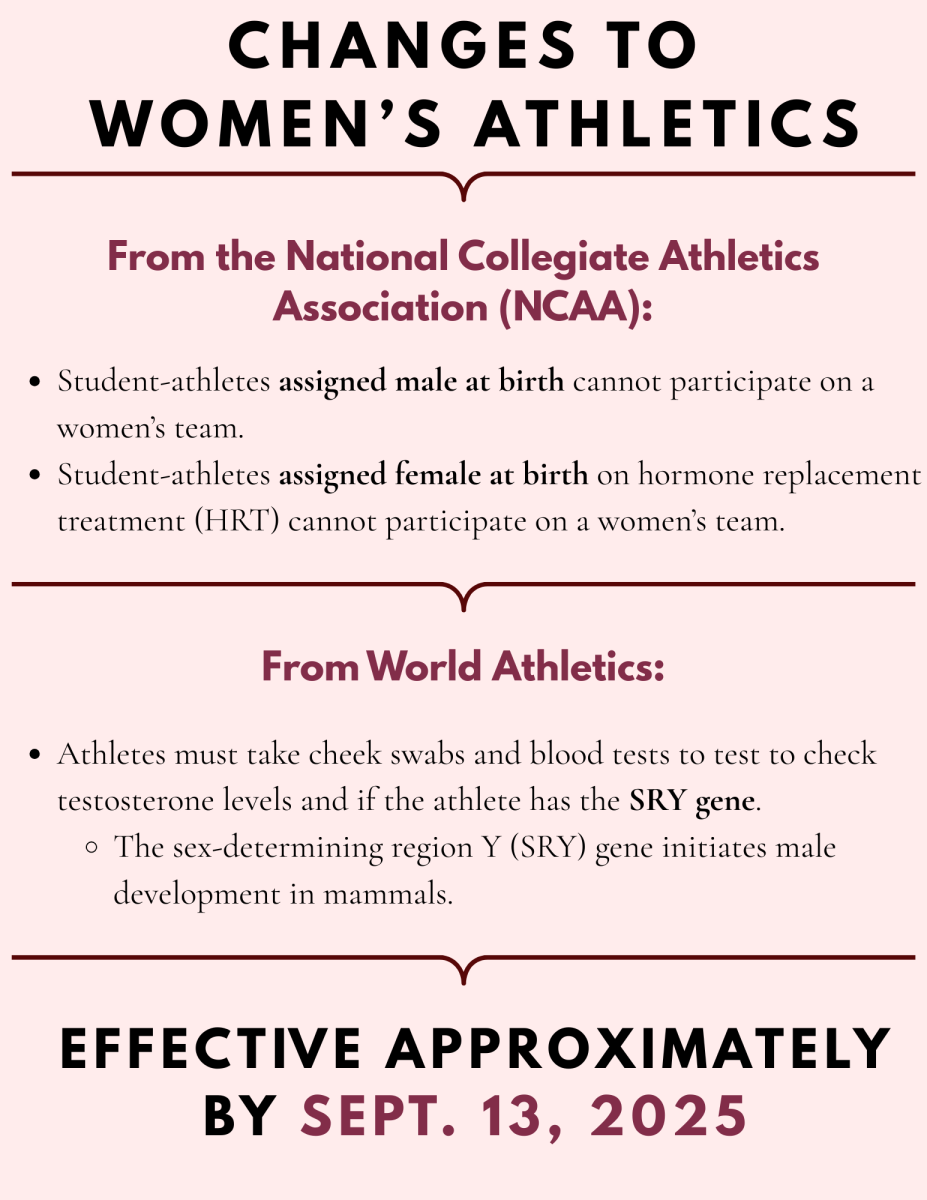Approximately 30% of Hamline’s undergraduate population participates in collegiate athletics across 22 varsity athletic programs.. However, outside of Hamline, eligibility requirements for athletes competing in the female category are shifting.
The National Collegiate Athletic Association (NCAA) released an updated participation policy for student-athletes on Feb. 6, restricting competition eligibility for transgender student-athletes assigned male at birth.
“A student-athlete assigned male at birth may not compete on a women’s team … A student-athlete assigned female at birth who has begun hormone therapy (e.g., testosterone) may not compete on a women’s team,” the policy reads.
However, the policy does not limit which gender a student is eligible to practice with and allows any student-athlete, regardless of sex assigned at birth or gender identity, to compete with a men’s team.
Increased restrictions for trans athletes do not stop at the American collegiate level. President of World Athletics — the international governing body for track and field, road running, cross-country and race walking — Sebastian Coe, confirmed World Athletics is implementing new rules. Among these new rules is a requirement to undergo cheek swabs and dry blood tests as biological sex tests for athletes competing in the female category to check testosterone levels and for the SRY gene, which indicates the presence of the Y chromosome. This version of testing was discontinued in the 1990s, but Coe explained it is being reintroduced to “protect” women’s athletics.
“It’s important to do it because it maintains everything that we’ve been talking about, and particularly recently, about not just talking about the integrity of female women’s sport, but actually guaranteeing it,” Coe said in a news conference.
These testing protocols are projected to be put in place by the September World Championships in Tokyo, but a specific timeline has yet to be laid out. At the time of publication, the NCAA had not adopted similar testing protocols. Hamline Athletic Director Alex Focke does not believe that this will directly impact Hamline’s student athletes.
“To my knowledge, the NCAA has not made any indications that they plan to implement the same testing requirements. Hamline University Athletics strives to support all of our student-athletes,” Focke said via email.
Director of the Gender, Sex, & Sexuality Resource Center (GSSRC) Eli Scriver believes that the testing World Athletics is requiring is not detrimental to just trans athletes but to all athletes.
“Any requirement to invade peoples' bodies affects everyone's bodily autonomy negatively. Attempting to biologically classify and categorize people is a slippery slope,” Scriver said via email.
Despite the new testing policies, World Athletics states that they support the privacy of elite athletes.
“World Athletics respects and preserves the dignity and privacy of individuals,” World Athletics said in a press release on Feb. 10 introducing stakeholder consultation on female eligibility.
The changes raise questions about the reliability of hormone levels and chromosomes to determine one’s success in the female category. Scriver explained it can be inaccurate to create binary distinctions based on these tests as they produce a spectrum of results that can not be limited to simply being categorized as strictly female and male. All bodies produce certain levels of both estrogen and testosterone, which nullifies the idea that individuals assigned female at birth wouldn’t also have testosterone.
“Frankly, hormone levels are as diverse among cis athletes as among trans athletes; just like height, the distribution of hormone levels has significant overlap among all human beings and there is no clear cutoff dividing cisgender men from cisgender women when it comes to measures like hormones. It's a subjective measurement disguised as objective.” Scriver said. “Chromosome testing (karyotyping) is extremely expensive and generally provides no information that actually impacts a person's athletic performance. It's also common for karyotyping to reveal that someone who has been assumed to be cisgender is actually intersex. It is an inaccurate and dangerous way to categorize people.”
GSSRC has resources and programming for trans students and athletes to answer questions and problems they may encounter and educate the campus about issues relating to the queer community. Sciver hopes students feel supported and know that there are resources available to aid them. GSSRC strives to stay educated on such issues to best help students, including student athletes.
“Trans athletes at Hamline are always welcome to meet with our staff to talk about issues they're facing and to collaborate with the Title IX office and athletics. On the back end, our staff stay up to date with changing legislation and work with the Title IX office to respond to changes and ensure that we're able to answer any questions students may have about policies or progress,” Scriver said.





















